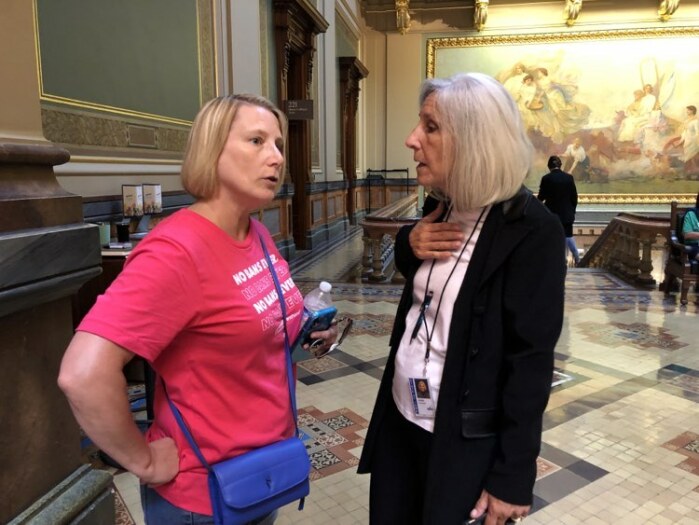Tracy Jones is a progressive political activist in Davenport. These comments are a longer version of testimony she delivered at an Iowa House public hearing on July 11 (see video below). She is pictured here on the left, speaking to State Representative Luana Stoltenberg.
In the spring of 1972, my mom was a pregnant 32-year-old with three young children. My sister was eleven years old, my brother was eight, and I was fifteen months old. Our mom had just experienced the collapse of her second marriage, and her pregnancy was not my dad’s.
I can only imagine the shame, fear and guilt that must have clung to her. Our mom was raised in a conservative and religious household. I’m certain an abortion wasn’t the first thing on her mind, but she knew her medical history. She had difficult pregnancies and suffered from severe preeclampsia with each.
As the pregnancy progressed, it became clear that this would be the pregnancy that would kill her. She needed an abortion but was living in a state where it wasn’t legal.
She decided to travel to New York for a safe and legal abortion. She saved what money she could, while also providing for us. As a woman of the early 1970s, her options were limited. She couldn’t get a credit card or loan to finance her trip.
By the time she was able to save enough money to travel to New York and pay for an abortion, she was too late. She was turned away at the clinic because she was determined to be at just 24 weeks. She was in an impossible situation which would have no good ending.
When she returned home, she knew she would die. I can only imagine the thoughts that passed through her mind, wondering what would happen to her children as her health began to deteriorate rapidly. She spent her last Fourth of July with her children watching fireworks and eating ice cream. Nine days later, she would say tear-filled goodbyes to her older children as she left for the hospital, knowing she wasn’t coming home. She died hours later from eclampsia.
After her death, it was like someone took an eraser and wiped her out of our lives. We were expected to live as if she never existed. My brother and I were separated from our older sister. She was taken from the funeral home to live with her biological father and his new family, whom she had never met. She thought our father was her dad, because he had raised and loved her since she was two years old. She called him daddy. No arrangements were made for visitation.
My sister, brother and I all went into survival mode. We never felt free to grieve and the message was clear, yet unspoken: we were not to speak of our mom or how she died. Whether because of anger, shame, or grief, it was clear that her death, and the seeming feelings it inspired in those around us, were unutterable.
This past May, my brother Gregg told our mother’s story on the House floor in Springfield, Illinois as a newly-elected state representative. I posted it to his TikTok. Most of the comments were very supportive and reassuring to read. But one person posted that our mom shouldn’t have gotten pregnant again—as if a death sentence were an appropriate punishment for an unplanned pregnancy. I had to monitor all the comments so my siblings and our children wouldn’t have to view such hurtful things.
My mother’s absence has always haunted me. I wonder if she would like the child I was, or the person I am and continue to become.
I don’t know my mother’s voice, her laugh, what she wanted for her future or mine. Anyone who tells you grief is linear is misleading. Grief is fear, love, sadness, and despair, which haunts you on your worst days and lies silently waiting on your best. I have many “what if” feelings, but all the “what if’s” won’t change what is: My mom died because she wasn’t allowed to make her own health care decisions.
The overturning of Roe v. Wade has created a situation where what happened to our family is happening again. It hurts to know there will be more families like ours. Women need to be able to have full control over their health care. They shouldn’t be suffering from miscarriages and waiting days or weeks for medical interventions.
How many women have died and will continue to die because a hospital’s legal department cannot give a doctor permission to assist women in life endangering situations? Medical decisions are between a woman and her doctor—not a lawmaker and a constituent.
Abortion is necessary health care, and women need to have unapologetic access. I’m asking you to vote no on this harmful legislation that will only provide a backdrop for future tragedies.
Editor’s note from Laura Belin: Here is the official video from the Iowa House public hearing. I’ve set it to play as Tracy Jones begins to speak. She had to shorten her remarks to conform to the two-minute time limit.
Top photo by Laura Belin: Tracy Jones (left) speaks to State Representative Luana Stoltenberg at the Iowa state capitol on July 11.


1 Comment
Memorable essay
I will never forget the story of what happened to your mother. And I’m sure the same is true for many other readers. Thank you for sharing your story and for your work on behalf of other women.
PrairieFan Wed 19 Jul 4:05 PM